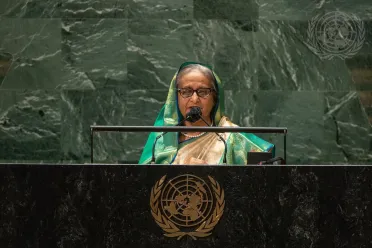Statement
Statement summary
SHEIKH HASINA, Prime Minister of Bangladesh, paid tribute to all the front‑line workers for their dedicated service and sacrifice during the pandemic, noting that her country — an avowed supporter of multilateralism — wishes to see the United Nations as a source of hope and inspiration during this critical time. “We must set aside our differences and rise as one harnessing our collective strength to build back a better world for all.” In this spirit, she said her country advocates for vaccine equality, resolution of the Rohingya crisis, climate justice and stands against any form of injustice against the Palestinian people. Against that backdrop, she detailed significant social and economic achievements of her country, which led to Bangladesh being ranked among the five fastest‑growing economies in the world. The Sustainable Development Report 2021 identified Bangladesh as having progressed the most since 2015. Such progress was due to heavy investment in women’s advancement and empowerment.
A strong health-care system and a timely adoption of a multi-pronged, multi‑stakeholder approach made the impact of COVID-19 “much less than feared” and allowed it to keep the economy afloat and supporting the most vulnerable, she continued. A well-timed intervention and the people’s resilience helped Bangladesh achieve over 5 per cent economic growth in 2020. However, she stressed that, for a COVID-free world, the international community cannot leave millions behind and called for universal and affordable access to vaccines. She went on to underscore a need for a global plan to prioritize education in the post-pandemic recovery and for the fair treatment of migrants, many of whom were on the front lines of the pandemic. The unprecedented challenges by the pandemic put at risk graduation prospects for many least developed countries, who will need motivation to continue their path.
Pointing to the disproportionate impact of climate change on vulnerable countries, she called upon the rich and industrialized countries “to cut emissions, compensate for the loss and damage, and ensure adequate financing and technology transfer for adaptation”. As countries prepare for the Glasgow conference, she cited her country’s Mujib Climate Prosperity Plan — Decade 2030 outlining a transformative agenda from climate vulnerability to prosperity.
Drawing attention to the recent political developments in Myanmar, she called on the international community to find a durable solution to this crisis “through a safe, sustainable and dignified return of the Rohingyas to their home in the Rakhine State”. “Peace remains a pre-eminent focus of our foreign policy,” she said, underlining that the people of Afghanistan should decide the course of their future themselves. As a proponent of the flagship resolution on the Culture of Peace and a leading peacekeeping nation, Bangladesh remains deeply committed to creating a peaceful society and maintains a “zero‑tolerance policy” towards terrorism and violent extremism.
Full statement
Read the full statement, in PDF format.
Photo

Previous sessions
Access the statements from previous sessions.
